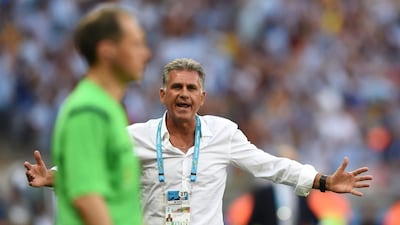When the qualifying draw was made for the Asian section of the 2014 World Cup, Iran were ranked seventh of the 43 teams and 54th in world. Now, largely thanks to coach Carlos Queiroz, the side are ranked first in Asia.
“It’s artificial, but it tastes good,” said Queiroz, 61, who was disappointed with the manner which his team exited Brazil without a win.
They had been involved in one of the most engrossing games of the tournament as they held finalists Argentina. Iran almost took the lead before succumbing to the genius of Lionel Messi at the end of an enthralling encounter in Belo Horizonte.
The Portuguese coach, who managed at Real Madrid and was twice Alex Ferguson’s assistant at Manchester United, signed a new contract to stay with Iran in September.
With four years in charge alongside his American assistant Dan Gaspar, Queiroz no longer faces the steep learning curve of being manager in a country subjected to international sanctions, but difficulties still prevail because of widespread international political and financial sanctions.
Preparation for the Asian Cup has been difficult. Iran have been unable to arrange friendlies against quality opponents, and problems caused by a lack of match practice could be acute, but that is only one of many issues for Iran.
They have no dedicated scouting staff and salaries are poor, as is the ability to pay them on time. Even securing money for team hotels and travel expenses is a struggle.
Queiroz, who relies on an international network of contacts garnered throughout a 40-year career in professional football, objected to his players flying economy and airport transfers that could take six hours early in his tenure. He won some concessions, but it remains a struggle against better-resourced opponents.
Iran’s football federation feel they are being suffocated. Queiroz and his staff laugh at the notion that politics should not interfere with sport because it affects his job every day.
Fifa have retained Iran’s World Cup qualification money because the banks are not allowed to transfer it into the country. Without that money, Iran’s players have not been paid for their achievement of reaching the World Cup finals.
Disappointment and frustration led to a loss of momentum after Brazil. The climate and atmosphere drains the players emotionally, and it is hard for them to be happy on the pitch when so many things are going wrong off it, but not a single player has turned his back on his country.
They will try to remain humble, disciplined and organised, and they are confident they can show the same fighting spirit to defeat any opponent, but despite their No 1 continental status, Iran are not among the favourites to add to their three Asian Cup triumphs, the last in 1976.
Japan, Australia and South Korea are the main contenders.
South Korea were one of only two opponents in competitive matches since the World Cup and were defeated 1-0 in November in Tehran. Iran also beat Iraq by the same score on January 4 in Sydney. Such victories justify some confidence and also illustrate the type of narrow triumphs achieved by Iran and their defensively solid side.
Iran have been based in Sydney ahead of their opening fixture on Sunday against Bahrain in the 30,000-capacity Melbourne Rectangular Stadium. Group C games against Qatar and the UAE follow in Sydney and Brisbane, where they will count on support from some of the 70,000 Iranians residing in Australia.
The core of the Iran team were in Brazil and gained experience of being away from home at a major event. They feel they went to Brazil to earn respect from the football world and achieved that, and while Queiroz is a hard task master, he is deeply respected by his players.
Despite all the problems around his team, the former Portugal manager is trying to focus his players’ attention on the games ahead. He has identified more young players including Sardar Azmoun, who has been dubbed “the Iranian Lionel Messi” but did not make the World Cup squad. The striker plays with Rubin Kazan in Russia and was the subject of a bid from Arsenal last year.
Then there is experience from older players such as captain Javad Nekounam, now 34 and back playing in Spain with Osasuna. Ashkan Dejagah, who left Fulham for Al Arabi in Qatar last year, is another of their better performers.
Quieroz will not admit it publicly, but the belief in the Iran camp is that they have a well-balanced team with greater strength and more options than they had in Brazil. With three games in nine days after playing only two games in six months, they will need both.
sports@thenational.ae
Follow us on Twitter @SprtNationalUAE


